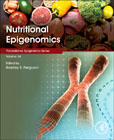
Nutritional Epigenomics offers a comprehensive overview of nutritional epigenomics as a mode of study, along with nutrition's role in the epigenomic regulation of disease, health and developmental processes. Here, an expert team of international contributors introduces readers to nutritional epigenomic regulators of gene expression, our diet's role in epigenomic regulation of disease and disease inheritance, caloric restriction and exercise as they relate to recent epigenomic findings, and the influence of nutritional epigenomics over circadian rhythms, aging and longevity, and fetal health and development, among other processes. Disease specific chapters address metabolic disease (obesity and diabetes), cancer, and neurodegeneration, among other disorders. Diet-gut microbiome interactions in the epigenomic regulation of disease are also discussed, as is the role of micronutrients and milk miRNAs in epigenetic regulation. Finally, chapter authors examine ongoing discussions of race and ethnicity in the social-epigenomic regulation of health and disease. Empowers the reader to employ nutritional epigenomics approaches in their own researchDiscusses the latest topics in nutritional epigenomics in the regulation of aging, circadian rhythm, inheritance and fetal development, as well as metabolism and diseaseOffers a full grounding in epigenetic reprogramming and nutritional intervention in the treatment and prevention of disease, as informed by population-based studies INDICE: 1. Introduction to nutritional epigenomics 2. DNA methylation and chromatin modifications 3. Non-coding RNAs as epigenetic regulators 4. The impact of race and ethnicity in the social-epigenomic regulation of disease 5. The epigenomic impact of methylation in metabolic dysfunction and cancer 6. The role for methylation on neurocognitive dysfunction 7. Histone acetylation in the epigenomic regulation of metabolic disease 8. Cancer and non-coding RNAs 9. Race and ethnicity in the social-epigenomic regulation of perinatal development 10. Maternal diet and epigenomic programming during in utero life 11. Maternal regulation of non-coding RNAs contributes to transgenerational inheritance of metabolic dysfunction 12. The paternal diet regulates the offspring epigenome and health 13. The interplay between diet, epigenetics and the circadian clock 14. Epigenetic regulation of the fetal circadian clock: implications for nutritional programming of circadian and metabolic function 15. The role for the microbiome in the regulation of the circadian clock and metabolism 16. Epigenomic reprogramming from caloric restriction on aging 17. Dietary restriction in the epigenomic regulation of cardiovascular disease 18. Epigenomic adaptations of exercise in the control of metabolic disease and cancer 19. Folate and the B vitamins impact the epigenome during development 20. Food bioactives in the epigenomic regulation of metabolic disease 21. Dietary regulators of the cancer epigenome 22. Plant phytochemicals regulate small non-coding RNAs in disease 23. Fatty acids as epigenomic regulators of neurocognitive health and disease 24. Diet-microbiome interactions and the regulation of the epigenome 25. Gut dysbiosis and its epigenomic impact on disease 26. The gut microbiome, epigenetics and the brain
- ISBN: 978-0-12-816843-1
- Editorial: Academic Press
- Encuadernacion: Rústica
- Páginas: 488
- Fecha Publicación: 01/08/2019
- Nº Volúmenes: 1
- Idioma: Inglés
